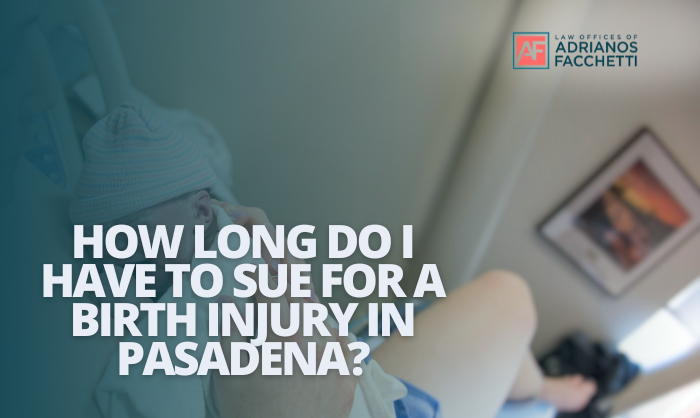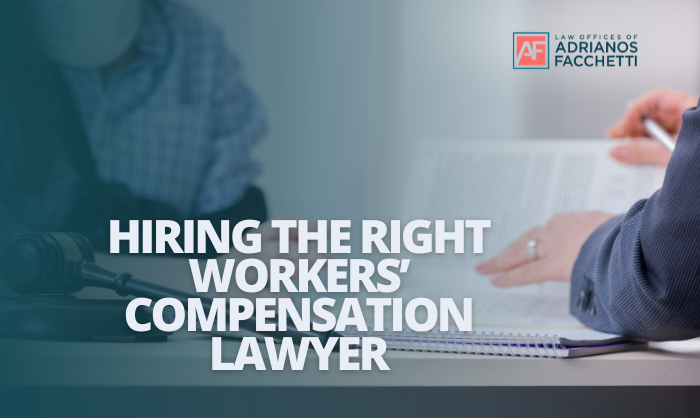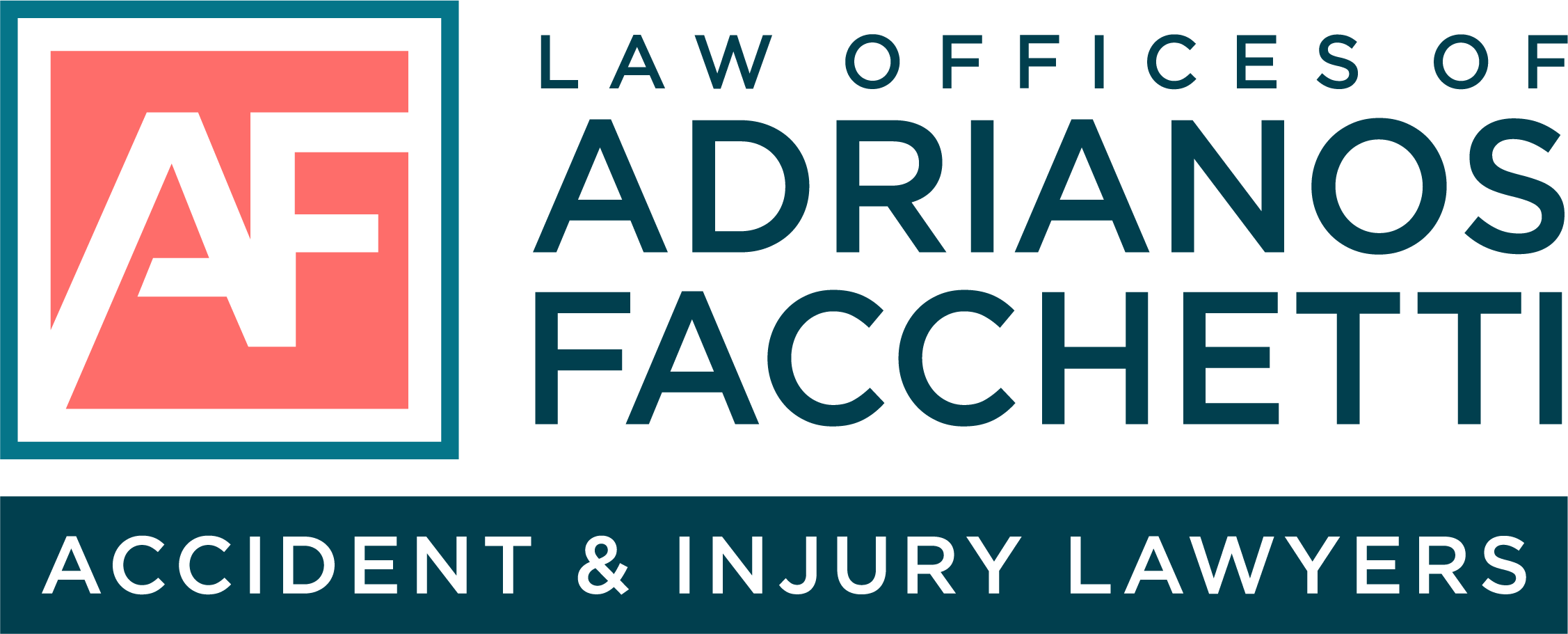Have you recently found out that your child’s medical condition might be linked to something that happened during birth? It’s a painful discover and naturally, your next question might be: “How long do you have to sue for a birth injury?”

In Pasadena, families facing this situation often don’t realize that strict time limits apply. Whether you're dealing with medical bills, changes in daily care, or just trying to make sense of what went wrong, understanding the legal window to file a birth injury lawsuit is crucial. If birth injury negligence may have played a role, acting within California’s statute of limitations is the first step in protecting your child’s future.
In this post, you’ll learn how these deadlines work, why they differ depending on who is filing the claim, and how a Pasadena birth injury lawyer can help you avoid missing your chance to take legal action.
What Is the Birth Injury Statute of Limitations in California?
If you’re thinking about legal action after a birth injury, you’re probably wondering how long you have to file. In California, there’s a law called the statute of limitations, which sets a time limit on how long you have to take legal steps after medical harm.
For most medical malpractice claims, you have either one year from the date you discovered the injury or up to three years from when the injury happened whichever comes first.
In Pasadena, the same rule applies. If a doctor or hospital didn’t meet the standard of care and caused your child’s injury, the clock starts ticking fast.
Parent Claims vs. Child Claims: What’s the Difference?
You might be surprised to learn that the legal timeline for suing can differ depending on who is filing the claim.
Parents can bring their own personal injury claim to recover things like medical expenses, property damage, or emotional distress caused by the incident but they usually have to act quickly. These claims generally follow the one- to three-year rule.
However, when it comes to the child’s injuries like the need for physical therapy, long-term medical care, or managing Cerebral palsy California law allows more time. In most cases, a child’s lawsuit can be filed up until their eighth birthday.
Are There Any Exceptions to the Statute of Limitations?
Every case is different, and the law makes room for that. There are a few situations where the normal time limits might not apply and these could be the difference between moving forward or losing your right to sue.
Delayed Discovery Rule
Sometimes, the effects of a birth injury don’t show up right away. Maybe a child doesn't start walking on time, or a learning delay shows up in preschool. If the injury wasn’t obvious at birth, the clock might start ticking later from the time you found out something was wrong.
Incapacity or Medical Incompetence
If a parent wasn’t mentally able to make decisions after childbirth due to medical or emotional trauma that might pause the clock on filing. This is rare but possible under California law.
Fraud or Concealment by the Hospital
If medical staff or a hospital tried to hide what happened or didn’t tell you the full truth your legal team could argue that the statute of limitations should be extended. That’s why having the right birth injury lawyers matters: they can uncover records and speak with expert witnesses to build a strong case.
Claims Against Government Hospitals
This one’s very specific. If your child was born at a public or county-run facility, you might have just six months to notify them with a special claim. If you miss that window, you might not be able to sue at all. These deadlines come up fast and are often missed without legal help.
Why Does the Birth Injury Statute of Limitations Exist?
You might be wondering why there’s even a deadline for something as serious as a birth injury. It comes down to fairness and facts. Over time, evidence can fade—records get misplaced, and medical experts may not recall specific details from years ago. These laws help ensure everyone involved, including healthcare professionals and families, has a clear and timely process.
Even though this can feel like a difficult time, the law still holds firm on these limits—even in emotional situations. Missing a filing deadline could mean losing your right to take action, which is why understanding these rules early can make a big difference in your child’s future.
When Does the Clock Start on a Birth Injury Claim?
A lot of parents ask: “When does the statute of limitations begin?” It’s not always right after birth. Sometimes, the countdown starts from the date of discovery the day you first realize something isn’t right and connect it to medical negligence.
For example, your baby might seem fine at first, but by age two, they’re still not walking or talking like other kids. After medical evaluations, doctors trace it back to oxygen deprivation during delivery. That discovery could start the clock on your birth injury medical malpractice claim.
Knowing how the law defines the start of your timeline is key to protecting your rights and filing at the right time.
California Birth Injury Lawsuit Trends (Recent Data)
Recent data shows that birth injury lawsuits are not rare in California and that many are dismissed because they’re filed too late. In a recent year, hundreds of cases were brought across Southern California, with many related to traumatic brain injuries, Brachial plexus injuries, and permanent birth injuries.
Unfortunately, some families lose their chance for justice simply because they didn’t know when or how to act. This highlights how important it is to speak with an experienced lawyer early someone who can help you navigate the statute of limitations before it’s too late.
What Happens If You Miss the Deadline?
If the deadline passes, the court may not allow your case to move forward no matter how serious the injury or mistake was. That means no opportunity to recover medical costs, rehabilitation expenses, or damages for mental anguish and loss of enjoyment of life.
There are a few rare exceptions, but for most medical malpractice victims, once that window closes, so does the chance to file a legal claim.
That’s why it’s so important to talk with a birth injury attorney who understands personal injury laws and deadlines and can act quickly on your behalf.
How a Pasadena Birth Injury Lawyer Can Help You Meet the Deadline
Filing a birth injury claim isn’t just about filling out paperwork it’s about knowing how the law works in your area. A Birth Injury Lawyer in Pasadena understands how local courts view statute of limitations rules and can help you act within the strict time limits California law requires.
Whether you're dealing with a private hospital or a public one like Antelope Valley Hospital, there are different rules to follow. Claims involving government agencies have even shorter deadlines sometimes as little as six months so early legal help really matters.
A skilled attorney can also help gather witness statements, track Ambulance expenses, and make sure your claim is on time, even when there are exceptions or delays. The sooner you speak to someone, the more options you have.
Pasadena Birth Injury Lawsuit FAQs
Can I still sue if I discovered the injury after birth?
Yes, California allows for what's called the “discovery rule,” where the timeline starts from when the injury is discovered, not necessarily when it happened. But it's still important to act quickly once you know.
What if the hospital didn’t tell me about the injury?
If a hospital failed to disclose key information, your case might qualify for an exception. A lawyer can look into any signs of anesthesia-related negligence, medical errors, or missing documentation.
How long after birth can I file a lawsuit in California?
The exact time depends on whether you’re filing for yourself or your child. In many cases, you have up to three years or until your child turns eight to file. But exceptions apply.
What if my child is showing symptoms at age 3 or later?
You may still be within the statute of limitations if the injury wasn't known earlier. Speaking to a lawyer helps confirm whether your case qualifies under the delayed discovery rule.
Are there different deadlines for suing a public hospital in Pasadena?
Yes. If a government agency is involved, you usually have to file a special claim within six months of the injury. This is why knowing whether the facility is public or private makes a big difference.
Talk to a Pasadena Birth Injury Attorney Today
Waiting too long could mean losing the right to seek financial losses for things like chiropractic care, urgent care facility costs, or future treatment. A local attorney can help you figure out if your child’s injury qualifies and guide you through the legal process so you can focus on your family.
Most attorneys offer a free consultation to help you understand your options. A conversation today could help you avoid missing your chance to hold liable parties accountable tomorrow. If you think you may have a case, it’s worth checking there’s no cost to ask.














